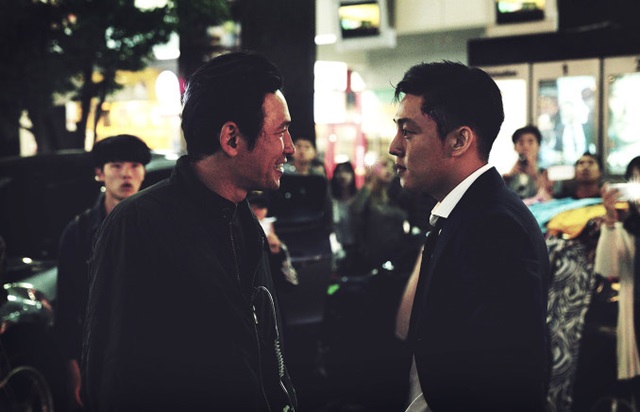
몆 년 전 뉴욕 타임즈의 논평에는 “반어적 표현”과 “직설적 표현”에 대한 작은 논쟁이 게재됐다. 프린스턴 대학교의 크리스티 웜폴 교수는 반어적 표현이 현대 문화 속에 지나치게 퍼져있다고 주장했다. 그녀는 “사람들이 진실한 감정을 숨기는 수단으로 반어법을 쓰고 있다”며 “직설적 표현은 우리 모두에게 견딜 수 없는 것이 되어가고 있다”고 말했다.
모든 사람들이 글에 동의하진 않겠지만, 만약 (미국의) TV나 할리우드 영화를 보면 크리스티 교수가 말하고 있는 게 무엇인지 금방 알아챌 수 있다. 어쩌면 그것을 “쿨한 연기”, 아무렇지 않은 척하기, 또는 세상을 향해 다소 냉소적인 태도로 말하기 등으로 부를지도 모르겠다. 그러나 영화 혹은 TV속 등장인물의 감정은 좀처럼 솔직하게 전달되지 않는다. 그들은 여러 겹의 반어적 표현에 숨어 간접적으로 소통한다. “직설적인 표현”은 피한다.
한국의 전형적인 TV드라마와 비교해보자. 물론 한국 드라마에서도 등장인물들이 때때로 감정을 숨기거나, 자유롭게 자신을 표현할 수 없는 상황에 처하기도 한다. 그러나 그들이 감정을 드러낼 때는 직설적인 표현을 쓰는데, 미국인의 관점에서는 종종 충격적으로 느껴질 때가 있다. 예를 들면 이렇다. 슬프면 대놓고 운다. 분노 혹은 배신감을 느끼면 소리를 지르며 물건을 집어 던진다. 사랑에 빠지면, 그게 얼굴에 다 쓰여 있다.

한국의 주류 영화와 독립영화에서, 등장인물들이 자신을 표현하는 방법은 다소 차이가 있다. 그러나 직설적인 표현은 모든 작품들에 나타난다. ‘베테랑’ 같은 영화의 에너지는 등장인물들의 솔직한 자기표현에서 대부분 나온다. 각각의 인물들은 고유의 스타일이 있지만 참거나 쿨한 척하기 보다는, 세상을 향해 감정을 내뱉는 경향을 가진다는 공통점이 있다.
한국 영화와 TV드라마를 처음 보기 시작했을 때, 조금 다른 뭔가를 느낄 수 있었다. 그러나 실제 차이는 스토리텔링이나 연출이 아닌 등장인물의 감정 표현 방식에 있었다는 것을 발견해 내기까지는 몇 년이 걸렸다. 미국 영화와 TV쇼를 보며 자라온 사람들에게 있어서 직설적 표현이 많고 반어적 표현이 적은 작품을 보는 것은 낯설지만 매력적인 경험이다.
물론, 한국 스타일의 직설적인 표현은 때론 장점이지만, 단점이 되기도 한다. 잘만 된다면야 영화나 TV 드라마를 에너지로 꽉 채울 수 있다. 그러나 어색한 방식이라면 이야기를 너무 단순하거나 멜로드라마처럼 (과장되게) 만들어 버릴 수도 있다. 배우들에게도 마찬가지다. 자연스러움을 유지하면서도 등장인물의 감정을 직접적으로 표현하는 것은 반드시 해결해야 할 과제일 테다. 그런 면에서 ‘밀양’의 전도연이나 ‘올드보이’의 최민식 같이 이미 잘 하고 있는 배우들을 보는 것은 대단히 흥미로운 일이다.
직설적인 표현이란 것이 전반적인 한국 문화를 반영한 것이 아닌가 추측해 본다. 그러나 어쩌면 지금과 같은 시대의 특징일 수도 있겠다. 역사를 되돌아보면, 반어적 표현의 유행은 수십 년 동안 부침(浮沈)을 거듭하는 경향이 있기 때문이다. 한국 문화도 미래의 어떤 시점이 되면 더 “반어적”으로 바뀔 수 있다는 뜻이다. 지금의 직설적인 한국 대중문화는 다른 나라 사람들에게 독특한 느낌을 주지만, 한국의 미래 세대들에게도 역시 비슷한 놀라움을 줄지도 모를 일이다.
영화 칼럼니스트 겸 배우

<원문보기>
Directness and Irony
A few years ago an op-ed in The New York Times raised a minor debate about the issue of “irony” and “directness.” Princeton University professor Christy Wampole argued that irony had spread too far in contemporary culture. She said that people were using irony as a way to hide their true feelings, and that, “Somehow, directness has become unbearable to us.”
Not everybody agreed with what she wrote, but if you turn on the TV or watch Hollywood cinema it’s not hard to spot what she’s talking about. You might call it “acting cool,” or pretending not to care, or simply taking on a somewhat cynical attitude towards the rest of the world. But the emotions felt by characters on TV or in the movies are rarely communicated in a straightforward way. Instead, they are communicated indirectly, behind several layers of irony. “Directness” is avoided.
Compare this to the typical Korean TV drama. Of course, sometimes characters hide their feelings, or find themselves in situations where they can’t freely express themselves. But when they do express their emotions, it is with a directness that, from an American perspective, can sometimes feel shocking. When they feel sad, they cry openly. When they feel angry or betrayed, they shout and throw things. When they fall in love, it is written all over their faces.
For both mainstream and independent Korean movies, the way that characters express themselves is a bit different. But there is a directness to these works as well. Much of the energy in a film like Veteran comes from the straightforward way that the characters express themselves. Each of the characters has their own style of speaking, but they share in common a tendency to throw their feelings out into the world, rather than to hold them back and try to stay cool.
When I first began to watch Korean movies and TV dramas, I could feel that there was something different about them. But it took years before I figured out that the real difference was not in the storytelling, or in the directing, but in the way that the characters express their emotions. For people who have grown up watching American films and TV shows, it’s strange and somehow fascinating to watch stories being told with so much directness, and so little irony.
Of course, this Korean-style directness is sometimes a strength, and sometimes a weakness. When it is done well, it can charge a film or TV drama with energy. But when it is done awkwardly, it makes a story feel overly simple or melodramatic. For actors as well, I think it must be a challenge to project a characters’ emotions in such a direct way, while still looking natural. But actors who do it well, like Jeon Do-yeon in Secret Sunshine or Choi Min-sik in Oldboy, are tremendously exciting to watch.
I suppose that this directness is partly a reflection of Korean culture in general. But it may also be a characteristic of this particular era. If you look back through history, the prevalence of irony tends to rise and fall throughout the decades. Korean culture too may become more “ironic” at some point in its future. In the present day, Korean pop culture feels distinctive to people in other countries because of its directness and lack of irony. It may be that future generations of Koreans will look back at today’s pop culture and feel a similar sense of surprise.
달시 파켓 '대한민국에서 사는 법' ▶ 시리즈 모아보기
기사 URL이 복사되었습니다.

댓글0